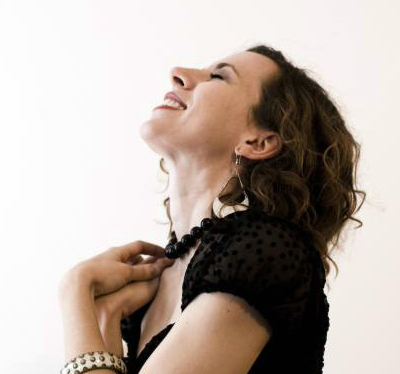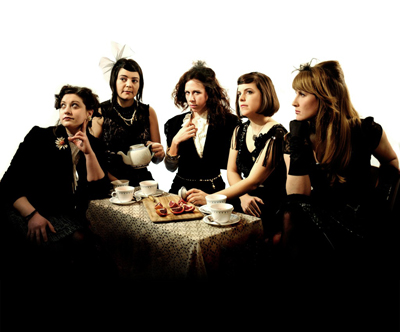By Stephen Brookes • The Washington Post • May 8, 2011
Ask composer Missy Mazzoli about the state of contemporary classical music, and you’ll get an earful. The academia-centered world of composing is “grumpy and dogmatic,” she says, an isolated, inward-looking place where composers need to write in an abstruse style if they want to be respected by their peers.
No matter that the thorny music of the last half-century has kept audiences away in droves; composers who try to reach a wider audience risk being “looked down on as stupid and uneducated,” she says, or they leave classical music entirely.
 Missy Mazzoli“The word ‘accessible’ can really ruffle feathers within the new music community,” Mazzoli says, with more than a trace of exasperation. “But I don’t think that ‘accessible’ equals oversimplifying, or dumbing things down, or playing to the lowest common denominator. The goal of my music has always been to communicate with an audience. That sounds obvious to 99 percent of the world, but it really is blasphemy to say that within academia!”
Missy Mazzoli“The word ‘accessible’ can really ruffle feathers within the new music community,” Mazzoli says, with more than a trace of exasperation. “But I don’t think that ‘accessible’ equals oversimplifying, or dumbing things down, or playing to the lowest common denominator. The goal of my music has always been to communicate with an audience. That sounds obvious to 99 percent of the world, but it really is blasphemy to say that within academia!”
Academia may just have to get used to it. The Brooklyn-based Mazzoli — who will perform with her electro-acoustic quintet, Victoire, at Atlas Performing Arts Center on Saturday — is one of the fastest-rising young composers in America, and she is determined to drag contemporary music out of its prickly seclusion and into the real world.
Her music is being played everywhere from rock clubs to Carnegie Hall, and the accolades are mounting. “Cathedral City,” which she released with Victoire last September, was ranked one of the best classical CDs of 2010 by the New Yorker, NPR and the New York Times. Her work has been commissioned by a who’s who of new music groups, from the Kronos Quartet and eighth blackbird to the American Composers Orchestra. The New York Times has called her “among the more consistently inventive, surprising composers now working in New York,” and Alex Ross of the New Yorker singled her out as “a leader of New York’s young moderns.”
Not bad for a composer who just turned 30.
But Mazzoli’s unique, hard-to-precisely-nail-down music (she describes it as a “blend of dreamy post-rock, quirky minimalism and rich romanticism”) reflects a trend among New York-based composers to write music for the omnivorous audiences of the 21st century — listeners with everything from Guillaume Dufay to Tuvan throat-singing in their ears. She and Victoire play to classical audiences (they recently shared a stage with the Jack Quartet), and her orchestral works are heard in concert halls, but she’s equally at home at pop festivals or in clubs. Many of Mazzoli’s most ardent fans, in fact, come from the world of indie rock.
It’s easy to see why. Mazzoli’s music is irresistibly seductive. You sink into “Cathedral City” as if it were a river, carried along on its shifting, propulsive rhythms and ethereal harmonies. Shimmering layers of sound rise to the surface, dissipate and drift away, as others appear to take their place. Melodic currents shift tempo and direction, eddies suddenly swirl, phrases build in hypnotic repetition before turning, through some deft sleight of ear, in unexpected new directions. It’s a gorgeous and often mysterious sound-world with an indie-rock sensibility, subtle and complex (there’s even a sort of fugue in the title track) but run through with what Mazzoli calls “beautiful simplicity.” And that may be the key to its appeal.
“A lot of my music is built from very simple materials, but I try to put them together in ways that are not so simple,” she says. “I use a lot of triads, a lot of very simple intervals and repetitive melodies, but I combine them in ways that obscure the key, for example, or obscure the meter. I want people to feel, ‘Oh, this sounds familiar, I think I know where it’s going’ — then to be continually surprised.”
But — to raise the obvious question — is music so comfortable in the indie-rock world still “classical”?
“People often ask me that,” says Mazzoli, who has a master’s in composition from Yale, majored in music at Boston University and won a Fulbright scholarship to study at the Royal Conservatory of the Hague with Louis Andriessen.
“And I sometimes say, ‘Well, the “Classical” era ended in 1830, so . . . no!’ But I am coming out of the classical tradition, even if I’m going in wildly different directions. I write for classical instruments, I write for orchestras, but I’m also very much influenced by indie rock and the vernacular. That’s sort of inevitable. I’m 30 years old; I’ve grown up with the Internet and with pop music for most of my life. How could that not influence me?”
Mazzoli’s deepest musical roots — and her independent approach to composing — go back to a childhood encounter, growing up outside of Philadelphia. Her family wasn’t particularly musical, but as a 9-year-old she stumbled across Beethoven and promptly fell in love.
“We had a couple of random Beethoven cassette tapes, but they were more about the life of Beethoven than his actual music,” she says, laughing. “They’d play a little of the Sixth Symphony and then say, ‘Ludwig van Beethoven was born in 1770, and . . .’ So I would just fast-forward to all the music.” But Beethoven awoke something powerful in her — “It felt sort of unhinged and unpredictable” — and she started composing on her own, puzzling it out as she went along.
 Victoire, at teaHaving to find her own way into classical music, she says now, was the best thing that could have happened to her.
Victoire, at teaHaving to find her own way into classical music, she says now, was the best thing that could have happened to her.
“There was always a healthy struggle to figure out how to write,” she says. “It was a series of small, personal victories throughout my childhood. No one was telling me to listen to anything, so I felt that every piece that I discovered was there for me alone.”
Mazzoli’s life now consists of almost constant writing and performing, largely with Victoire, which she formed in 2008 with like-minded friends. The all-female quintet (Olivia De Prato on violin, Eileen Mack on clarinet, Lorna Krier on keyboards and Eleonore Oppenheim on bass, with Mazzoli doubling on keyboards and lo-fi electronics) has become a crucial sounding board. “I can try things and fail spectacularly, but do it in the privacy of my own home,” she says. Equally importantly, she can bring her music directly to audiences, anywhere in the world.
“That’s the point of my work: I don’t want it to exist in a vacuum,” she says. “And there’s a community in New York that feels the same way.” A largely Brooklyn-based group of composers and performers — people such as William Brittelle, Nico Muhly, the NOW Ensemble (which will perform with Victoire on Saturday), Judd Greenstein, Nadia Sirota and many others — are producing music of exceptional complexity and sophistication while remaining, Mazzoli says, “unabashedly committed” to building audiences.
“We’re all creating opportunities for each other, running festivals, creating ensembles that perform each other’s music. We’re not just in it for ourselves; that’s what makes this group of composers stand out,” she says. “We’re in it for the good of the field.”
****
Missy Mazzoli and Victoire will be performing at the Atlas Performing Arts Center on a double bill with the NOW Ensemble on Saturday at 8 p.m. There will be a pre-concert presentation by Mazzoli and composer Judd Greenstein at 6:15. On May 20, the new music ensemble Eighth Blackbird will perform Mazzoli’s “Still Life With Avalanche” at the Library of Congress.